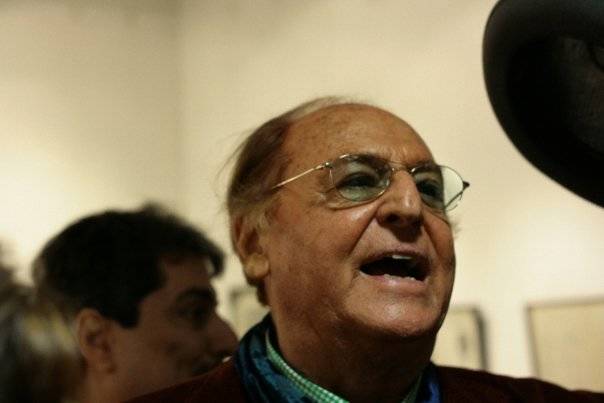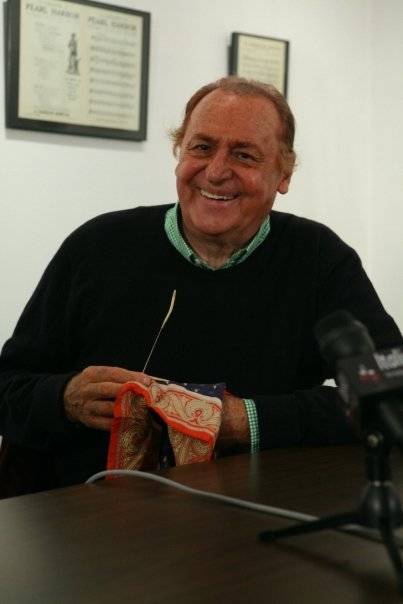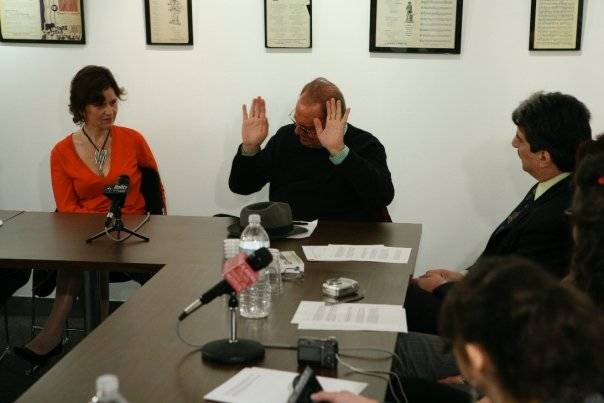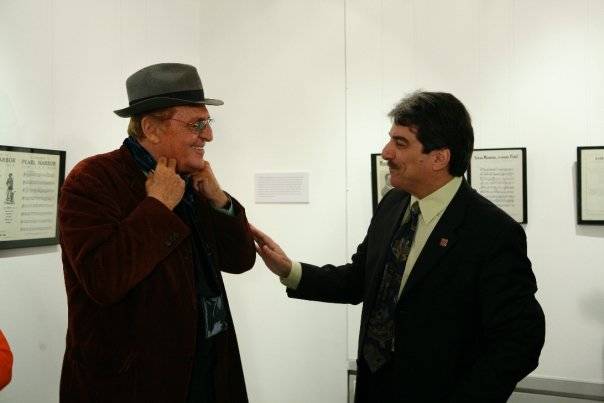An Italian-American Morning with Renzo Arbore
11:00 a.m. The video cameras were all set up in the conference room at the Calandra Italian-American Institute. Piles of paper cups and bottles of water had already been placed on the large L-shaped table, waiting for the interview to begin.
Within a half-hour, the elevator doors opened and Renzo Arbore arrived. Tinted eyeglasses, large hat, fancy velvet scarf, sweater, and blue jeans: that’s always been his style and that’s what he wore that morning.
A “jazz clarinetist”: this is how he introduced himself. Well, that might be "my favorite job,” he said, but for many Italians and Italian-Americans he represents a bit more than that.
Renzo is an entertainer, singer, musician, actor, and a talent scout. In a word, he is a cultural broker.
Well-known in both the U.S. and Italy, Renzo has always felt a special bond with the US: he discovered New Orleans jazz at a very early age and wore blue jeans
when they “still did not exist in the town where [he] grew up, in Foggia.” As a multifaceted personality, during his early career he revolutionized national TV and radio broadcasting by importing American formats and programs to Italy.
Nowadays, he is one of the main representatives of Italian culture abroad, as the president of the internationally renowned Umbria Jazz Festival, and probably the most appreciated contemporary interpreter of Neapolitan music which he plays with his Orchestra Italiana. Italians living in the U.S. as well as Italian-Americans discover in his music images and melodies of their home country mixed with a blend of jazz, samba, flamenco, and many other exotic rhythms.
We spent the entire morning with Renzo, interviewing him for more than two hours. Letizia Airos, Marina Melchionda, Vincenzo Ruocco, Giovanna Landolfi and Giuditta Danzi were all there with him.
Anthony J. Tamburri and Joseph Sciorra, Dean and Associate Director for Academic and Cultural Programs at the Calandra Institute, respectively, as well as members of our editorial staff, were also on hand to actively participate in the conversation by raising issues that concern both Italians and Italian-Americans living in the U.S.
A relaxed yet joyful atmosphere characterized this intimate conversation. Surrounded by Lucia Grillo’s and Fulvio Minichini’s video cameras, we felt free to ask Renzo all kinds of questions. His pleasant demeanor suggested that we could push the envelope: he was open to it.
Here are some excerpts of what Renzo said about the topics we discussed. Of course this is only a preview of what you will soon hear and see when the video is posted!
RENZO AND…
… THE AMERICANS: I met an American
soldier in Foggia, John. He used to give me chewing gum and chocolate. That is when my love for the U.S. first bloomed […]. I went to Naples to study law. People there say that when Renato Carosone wrote “Tu vuò fa l’Americano” (You Want to Be an American), he was inspired by me and my friend Gerardo Sorrentino who were the only people wearing blue jeans in the city.
… THE ITALIAN-AMERICANS: Italian-Americans have done much for both Italy and the U.S. I remember when they built the “Sollievo della Sofferenza” hospital in San Giovanni Rotondo, the town where Padre Pio lived and preached. Our local politicians said that most of the donations came from our Italian-American supporters. Well, the main backer of the project was Fiorello La Guardia, New York City’s former mayor.
… IMMIGRATION: I think Italians should remember that they, too, emigrated and found great discrimination when they arrived in their new lands. […] I am part of a world where racism does not exist. Musicians are used to playing with red, yellow, and black-skinned people, just like brothers. It is the feeling of fraternity that led me to write my song “Quando arriveranno gli Africani” (When the Africans Arrive).
…JAZZ MUSIC: When I was a kid I used to open the window at night and listen to the music coming from the American military base in town. They played New Orleans jazz, which connected me to America for good. Me and my group of friends started playing it in small pubs and bars in Naples, and it made us very popular. […] Now I am proud to be the president of the Umbria Jazz Festival, one of the most renowned jazz events worldwide.
…NEAPOLITAN MUSIC: In the early 1990s I came up with “Napoli Punto e a Capo” and founded the Orchestra Italiana. My idea was to prove that Neapolitan music could become the symbol of the city’s renaissance and did not deserve to be treated as “old stuff” and be forgotten. People loved our covers – I was right. That’s when I came here to New York and played Carnegie Hall and Radio City.
…THE RADIO: When I worked in radio my aim was to import the “American format” to Italy, based on sketches and improvisation. At least was my idea! My colleagues and I directed entire shows with no outline at all. It was hard sometimes; you never knew what was going to happen. But we had lots of fun. It was only after a long time that I found out that American shows were everything except improvisation!
…THE TV: I remember when TV was a form of art, and shows were broadcast because they were interesting, culturally stimulating, and purely funny. My friends and I came up with new ideas while talking in a café in Foggia, sipping coffee all day long. Or maybe while looking at the stars for inspiration. That’s how I invented the first talk show in Italy, Speciale per Voi. There young people could freely chat with their idols, asking all kind of questions. It was a continuous cultural exchange. Now? It's all about money and audience. Nowadays I would define TV as the "media of the neighborhood" – you know, a meeting point where people gossip all day long, as if they were sitting on the doorsteps of their townhouses [...]. It’s discouraging to see what it’s teaching young kids today. There was a scene I witnessed on the beach that disturbed me quite a bit: I saw a group of very young girls showing off for a boy who sat on a "throne.” They “were inspired” by a talk-show broadcast on one of our national channels. [...]. Yes, I am very disappointed. Would I accept the role of director of RAI International again? No, of course not. Repetita non iuvant!
…NEW TECHNOLOGY: I think the Internet is something God sent us; it is providential. Why? Because it has the ability to encourage people to research and stay informed about what happens around them, while lately TV has done the opposite. I was starting to get worried […]. Plus, consider how some technological innovations have changed the world. For example, the diffusion of the “song” is due to the invention of the LP, which could hold only short pieces. Can you imagine us playing entire romanzas today!?”
This is just a taste of what’s to come! Stay with us and you’ll find out more about our meeting with Renzo Arbore!










































i-Italy
Facebook
Google+
This work may not be reproduced, in whole or in part, without prior written permission.
Questo lavoro non può essere riprodotto, in tutto o in parte, senza permesso scritto.